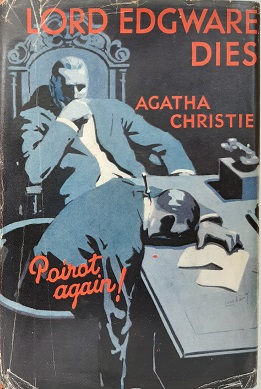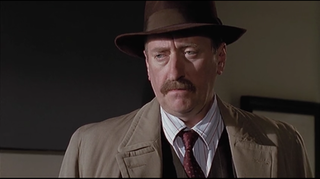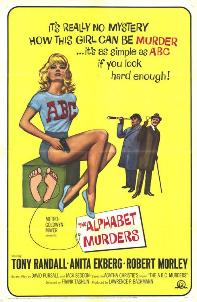
Lord Edgware Dies is a work of detective fiction by British writer Agatha Christie, published in the UK by the Collins Crime Club in September 1933 and in the US by Dodd, Mead and Company later in the same year under the title of Thirteen at Dinner. Before its book publication, the novel was serialised in six issues of The American Magazine as 13 For Dinner.

Inspector James Japp is a fictional character who appears in several of Agatha Christie's novels featuring Hercule Poirot.

The Alphabet Murders is a 1965 British detective film directed by Frank Tashlin and starring Tony Randall as Hercule Poirot. It is based on the 1936 novel The A.B.C. Murders by Agatha Christie.

Black Coffee is a play by the British crime-fiction author Agatha Christie (1890–1976) which was produced initially in 1930. The first piece that Christie wrote for the stage, it launched a successful second career for her as a playwright. In the play, a scientist discovers that someone in his household has stolen the formula for an explosive. The scientist calls Hercule Poirot to investigate, but is murdered just as Poirot arrives with Hastings and Inspector Japp.

Claude Austin Trevor Schilsky was an Irish actor who had a long career in film and television.

Thirteen at Dinner is a 1985 British-American made-for-television mystery film featuring the Belgian detective Hercule Poirot. Adapted by Rod Browning from the 1933 Agatha Christie novel Lord Edgware Dies, it was directed by Lou Antonio and starred Peter Ustinov, Faye Dunaway, Jonathan Cecil, Diane Keen, Bill Nighy and David Suchet, who was later to play Poirot in the long-running television series entitled Agatha Christie's Poirot. The film first aired on CBS Television on October 18, 1985.
Brown Sugar is a 1931 British romance film directed by Leslie S. Hiscott and starring Constance Carpenter, Francis Lister, Allan Aynesworth and Helen Haye. It was largely filmed at Twickenham Studios in west London. It was produced by Julius Hagen as a quota quickie for distribution by the American company Warner Brothers. Local gentry disapprove when Lord Sloane chooses an actress for a wife.

Alibi is a 1931 British mystery detective film directed by Leslie S. Hiscott and starring Austin Trevor, Franklin Dyall, and Elizabeth Allan.
The House of the Arrow is a 1930 British mystery film directed by Leslie S. Hiscott and starring Dennis Neilson-Terry, Benita Hume and Richard Cooper. It was based on the 1924 book The House of the Arrow, and its subsequent stage play adaptation by A.E.W. Mason, part of his Inspector Hanaud series. It was one of four film adaptations of the story. It was made at Twickenham Studios. A quota quickie, it was distributed by the American company Warner Brothers. A separate French-language version La Maison de la Fléche was also produced at Twickenham directed by Henri Fescourt.
A Safe Proposition is a 1932 British comedy film directed by Leslie S. Hiscott and starring A. W. Baskcomb, Barbara Gott, Harold French and Austin Trevor. It was made at Twickenham Studios as a quota quickie for release by Fox Film.
The Crooked Lady is a 1932 British drama film directed by Leslie S. Hiscott and starring George Graves, Isobel Elsom, Ursula Jeans and Austin Trevor. A quota quickie, it was filmed at Twickenham Studios.
Death on the Set is a 1935 British mystery film directed by Leslie S. Hiscott and starring Henry Kendall, Eve Gray, Jeanne Stuart and Wally Patch. Its plot concerns a film director who murders a leading gangster and takes his place, later pinning the killing on a prominent actress. It is also known by the alternative title Murder on the Set.
Julius Hagen (1884–1940) was a German-born British film producer who produced more than a hundred films in Britain.
The Silver Spoon is a 1933 British comedy crime film directed by George King and starring Ian Hunter, Garry Marsh and Cecil Parker. It was produced and distributed as a quota quickie by Warner Brothers and was shot at the company's Teddington Studios in London. The Silver Spoon is classed by the British Film Institute as a lost film.

The Ghost Camera is a 1933 British mystery film directed by Bernard Vorhaus, starring Henry Kendall, Ida Lupino and John Mills, and based on "A Mystery Narrative", a short story by Joseph Jefferson Farjeon.

The Pointing Finger is a 1933 British drama film directed by George Pearson and starring John Stuart, Viola Keats and Leslie Perrins. The screenplay concerns a man who plots to murder his half-brother so he can claim his earldom and an inheritance. The film was made by Twickenham Film Studios with sets designed by the art director James A. Carter. It was distributed by RKO Pictures as a quota quickie. Based on the novel The Pointing Finger (1907) by "Rita," it was a remake of the 1922 film of the same name.
Mannequin is a 1933 British drama film directed by George A. Cooper and starring Harold French, Judy Kelly and Diana Beaumont. It was made at Twickenham Studios in London with sets designed by the art director James A. Carter. Produced as a quota quickie, it was released by the American distributor RKO.
Youthful Folly is a 1934 British drama film directed by Miles Mander and starring Irene Vanbrugh, Jane Carr and Mary Lawson. It was a quota quickie made at Shepperton Studios for release by Columbia Pictures. It portrays the love lives of the son of daughter of an aristocratic lady.
Whispering Tongues is a 1934 British crime film directed by George Pearson and starring Reginald Tate, Jane Welsh and Russell Thorndike. The screenplay concerns a son who seeks revenge by stealing valuables from the men who drove his father to suicide.
Annie, Leave the Room! is a 1935 British comedy film directed by Leslie S. Hiscott and starring Morton Selten, Eva Moore and Jane Carr. It was made at Twickenham Studios as a quota quickie for release by Universal Pictures.









